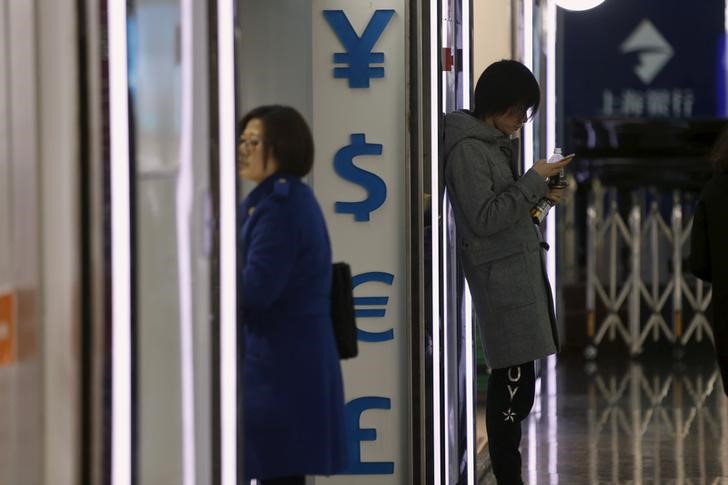By Samuel Shen and John Ruwitch
SHANGHAI (Reuters) - Hobbled by the yuan's unexpected surge this year, more Chinese companies are trading currency derivatives to hedge risks, although many mainland firms remain exposed to swings in China's increasingly volatile currency.
Companies in China have for years been accustomed to a stable yuan that moved in one direction for long periods of time. Yuan hedging markets are still in their infancy, stymied by the central bank's stringent requirements for hedging and the limited participation of speculators and large state-owned firms, which could make markets more liquid.
But that is changing. Volatility has risen steadily since 2015 after the People's Bank of China decided to let market forces have a bigger sway in the yuan's direction, clamped down on capital flows and, more recently, introduced more opacity in the way it sets the currency's value.
The yuan slumped 6.5 percent against the U.S. dollar in 2016, but has unexpectedly reversed course this year, surging 5.3 percent so far.
More than 70 China-listed companies have announced plans this year to use derivatives for risk-hedging, according to Reuters' calculations based on exchange filings. Among them, 27 firms are trading yuan forwards, swaps or options for the first time.
"Last year, when the yuan was falling, there was no need to hedge, because depreciation was on our side," Jiang Tao, an investor relations official at Shenzhen Yuto Packaging Technology Co, told Reuters.
The Chinese exporter of gift boxes and stickers is one of the 70 companies reviewed and generates over 60 percent of its revenue overseas. In the first half of this year, it posted a 47.5 million yuan currency loss due to a stronger yuan.
It says the less predictable currency trends have prompted it to use derivatives this year to hedge risks.
Although Reuters' calculations are not exhaustive, with some companies not disclosing their use of derivatives, it nonetheless shows a rising interest in hedging currency risks. Between 2012 and 2014, only about 30 companies each year announced hedging plans, but that number jumped to 68 last year.
"It's more about mentality, than about competence," said Oliver Rui, Professor of Finance and Accounting at business school CEIBS.
Rui, who sits on the boards of several Chinese companies as an independent director, said most firms are not used to hedging because the yuan has only become more volatile in recent years.
Corporate China's still evolving risk-management culture, however, poses a dilemma for Beijing, which has been under international pressure to liberalize the yuan while also seeking to prevent destabilizing currency swings.
EXPORTER COMPLACENCY
China has seen a rise in foreign exchange transaction volumes between banks and clients, a barometer of companies' hedging activities, which has tracked increasing volatility in the yuan over the past six months.
But that monthly turnover of around $500 million is tiny for the world's second biggest economy, which has an annual trade turnover of $3.7 trillion yuan, as well as increasing offshore financing and investment activities. Several local companies have turned to overseas derivatives market, such as Hong Kong's yuan futures, or non-deliverable forwards (NDFs).
A lack of participation by China's state-owned enterprises (SOEs) in the derivatives market has also kept volumes low. Many such firms were barred from being too active in the onshore yuan market after incurring losses in overseas derivatives during the 2007-08 global financial crisis.
For export-oriented manufacturers such as Shenzhen Yuto Packaging Technology Co., a strong yuan has meant weaker dollar income.
According to an estimate by brokerage Minsheng Securities, China's listed manufacturers recorded currency losses totaling 8 billion yuan ($1.20 billion) during the first six months, equivalent to 1 percent of their combined net profit. Nearly 1,400 listed firms in the sector said they suffered.
Shandong Laiwu Jinlei Wind Power Technology Co is another firm making its debut in the currency derivatives market. It last month announced plans to conduct hedging worth up to $40 million for 2017.
Others, such as Kingclean Electric, have been stung by unhedged positions. The home appliance maker, dubbed "the King of Cleanliness", booked a 62.9 million yuan currency loss in the first half and as a result posted a meager 2 percent net profit gain despite a 37 percent surge in sales.
Liu Zheng, an analyst at Zheshang Securities Co, pointed to Kingclean's U.S. dollar cash pile, worth more than $400 million at the end of June, which he says was unhedged. The company didn't return emailed requests for comments.
"Apparently, the company was betting that yuan would depreciate further, following last year's tumble," Liu said.
